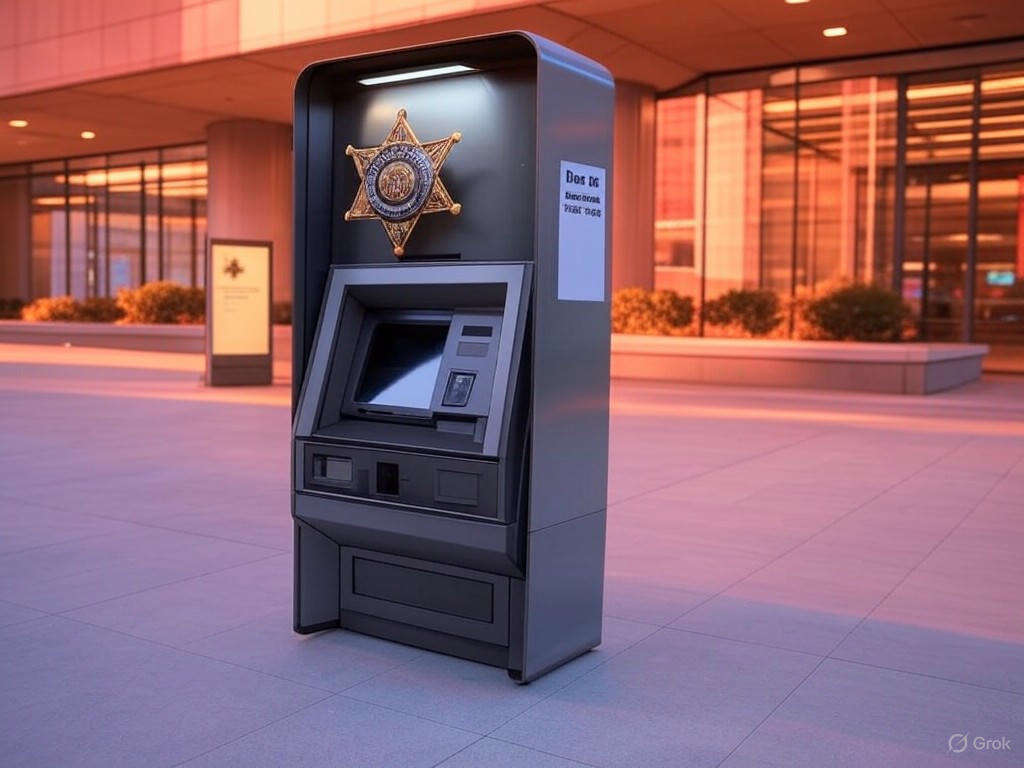
Cryptocurrency ATM Laws Urged by Wood County Sheriff’s Office
The Rising Concerns Behind Cryptocurrency ATM Laws
The Wood County Sheriff’s Office is pushing hard for new cryptocurrency ATM laws as scams linked to these machines continue to rise. These digital kiosks, popping up in everyday spots like gas stations and convenience stores, are drawing in fraudsters who target vulnerable people, such as the elderly, with promises of quick riches or urgent fixes. It’s clear that without stronger regulatory measures, consumers remain at risk, and this call for action aims to create a safer environment for everyone involved.
Have you ever wondered how something as innovative as cryptocurrency could turn into a tool for deception? In Wood County, local authorities are highlighting the need for immediate changes to prevent these ATMs from facilitating irreversible financial losses.
Understanding the Growing Threat of Crypto ATM Scams
Cryptocurrency ATMs let users swap cash for digital coins like Bitcoin, offering a bridge between traditional money and the crypto world. But their lack of oversight has made them prime targets for scammers, who trick people into depositing funds that vanish forever. The Wood County Sheriff’s Department has reported a sharp uptick in these incidents, where victims are lured by fake offers and end up with no way to recover their money.
- Scammers often convince people to convert large cash amounts to crypto under deceptive pretenses, leaving them empty-handed.
- These schemes hit vulnerable groups hardest, including seniors who might not fully grasp the risks.
- Unlike bank transactions, crypto transfers aren’t insured or reversible, making every deposit a potential loss.
Imagine walking into a store, seeing a shiny ATM promising easy access to Bitcoin, and then realizing too late it’s part of a scam. This is the reality for many, underscoring why cryptocurrency ATM laws are essential for protection.
A Real-Life Example: The $20,000 Bitcoin ATM Scam
Take the case of a Wood County resident who lost $20,000 in a scam involving a Coinhub Bitcoin ATM. The victim was pressured by fraudsters to deposit cash, which was quickly sent to an anonymous wallet, leaving them devastated. Law enforcement stepped in, securing a search warrant and recovering some funds, but this incident exposed major flaws in current safeguards for cryptocurrency ATM laws.
What makes this story so alarming is how easily it could happen to anyone. It’s a wake-up call for better rules to ensure these machines don’t enable such fraud.
Key Reasons for Pushing Cryptocurrency ATM Regulations
From the perspective of law enforcement, the need for cryptocurrency ATM laws stems from operators often becoming accidental accomplices in crimes. While federal rules require them to register as Money Services Businesses and follow anti-money laundering protocols, enforcement at the local level is spotty at best.
- There’s no standard for clear consumer warnings or transparent fees, which lets scams slip through.
- Without transaction limits, fraudsters can exploit these machines for large-scale theft.
- Operators lack requirements for immediate customer support, leaving users in the lurch during suspicious activity.
- Finally, the absence of a central oversight body means regulations vary widely, creating loopholes everywhere.
This patchwork of rules isn’t cutting it, and that’s why advocates like the Wood County Sheriff’s Office are demanding more unified cryptocurrency ATM laws.
Exploring Potential Legislative Solutions for Crypto ATMs
Across the U.S., states are stepping up with proposals to address these gaps, focusing on measures that could transform how cryptocurrency ATM laws are enforced. For instance, new bills might require operators to register with state agencies, ensuring they’re accountable from the start.
- Mandatory warnings about risks and fraud alerts directly on the machines could help educate users on the spot.
- Setting daily transaction caps, like $1,000 per person, would limit the damage from scams.
- Capping fees at reasonable levels, such as $5 or a percentage of the transaction, promotes fairness.
- Requiring live customer service ensures help is available if something goes wrong.
These changes aren’t just about stopping bad actors; they’re about building trust in crypto technology. If implemented, they could reduce fraud and make cryptocurrency more accessible without the fear of exploitation.
How can we make sure these laws are effective? By learning from places like Washington state, which already has some licensing requirements, and pushing for broader adoption nationwide.
Essential Tips for Consumers on Cryptocurrency ATMs
Since cryptocurrency transactions lack the protections of traditional banking, it’s crucial to stay vigilant when using these ATMs. Here are some practical steps to avoid falling victim to a scam and align with the spirit of emerging cryptocurrency ATM laws.
- Always question unsolicited requests, especially if they demand deposits into a crypto ATM—legitimate entities won’t ask for this.
- Remember, no real government or business will insist on crypto payments via these machines.
- Look for clear warnings and fee details before proceeding, and if anything seems off, walk away.
- Report any suspicions right away to local authorities to help track and prevent further incidents.
Think about it: A simple moment of caution could save you from significant heartbreak. These tips aren’t just advice—they’re a direct response to the concerns raised by officials like those in Wood County.
The Nationwide Scope of Crypto Scams and Regulatory Needs
Crypto ATM fraud isn’t just a local issue in Wood County; it’s a national epidemic. The FBI reports that crypto-related scams cost Americans $5.6 billion in 2023 alone, with scams involving ATMs playing a big role. At least 15 states are now considering or implementing tougher cryptocurrency ATM laws, though approaches still vary widely.
| State | Key Regulation | Oversight |
|---|---|---|
| Wisconsin | Existing but fragmented rules | Relies on local enforcement |
| Washington | Includes licensing and warnings | No dedicated agency yet |
| Maryland | Proposes alerts, caps, and limits | Pending legislative oversight |
This inconsistency highlights why standardized cryptocurrency ATM laws are so vital—without them, scammers can easily hop from state to state.
What’s your take on these varying regulations? Could a unified national approach make a real difference in protecting everyday users?
What Operators Must Do: Compliance and Cryptocurrency ATM Laws
Bitcoin ATM operators have federal obligations, including registering as Money Services Businesses with FinCEN and setting up strong anti-money laundering programs. But to truly align with calls for cryptocurrency ATM laws, they need to go further with robust know-your-customer checks and accurate transaction reporting.
- Enhancing AML and KYC measures can help flag suspicious activity before it escalates.
- State-level enforcement would add another layer, promoting innovation while curbing abuse.
- Ultimately, better compliance builds consumer confidence in the crypto economy.
By stepping up, operators can turn these machines from vulnerabilities into secure tools. It’s a win for everyone if we get this right.
Local Stories: The Human Side of Crypto Scams
In Wood County, residents have shared heartbreaking tales of financial ruin from these scams, emphasizing the emotional toll beyond just dollars lost. Law enforcement urges quick reporting to maximize recovery chances, but education and new regulations offer the best long-term defense.
“No bank, business, or government agency will ever tell you to put funds into a cryptocurrency machine.” – Wood County Sheriff’s Department
This quote hits home—it’s a simple reminder that can save lives. What if sharing stories like these could prevent the next victim?
Moving Forward: The Future of Cryptocurrency ATM Laws
The push from the Wood County Sheriff’s Office for comprehensive cryptocurrency ATM laws is more than a local plea—it’s a blueprint for national change. By collaborating among policymakers, operators, and the public, we can ensure crypto’s benefits are enjoyed safely. This means prioritizing transparency, limits, and education to foster a responsible digital economy.
Ready to take action? Stay informed, report suspicious activity, and let’s work together to make cryptocurrency safer for all.
Resources and Reporting Scams
- Wood County Sheriff’s Office Statement
- Crypto ATM Scam Alerts – Wood County
- Bitcoin ATM Laws and Compliance Guide
- National Crypto ATM Regulation Efforts
References
- Wood County Sheriff’s Office Calls for Cryptocurrency ATM Laws. Source
- LSGT LLC v. County of Wood, Respondent-Respondent (2025). Source
- Sheriff’s Department Warns of Cryptocurrency Machine Scam. Source
- Lawmakers Seek Crypto ATM Regulations to Fight Fraud. Source
- Bitcoin ATM Laws: A Complete Guide to Compliance, Security, and …. Source
- Crypto ATMs: Regulating the Unregulated – AARP States. Source
cryptocurrency ATM laws, Wood County Sheriff’s Office, crypto scam prevention, Bitcoin ATM regulation, consumer protection, digital currency scams, crypto ATM safeguards, fraud prevention laws, cryptocurrency regulations, ATM compliance measures







